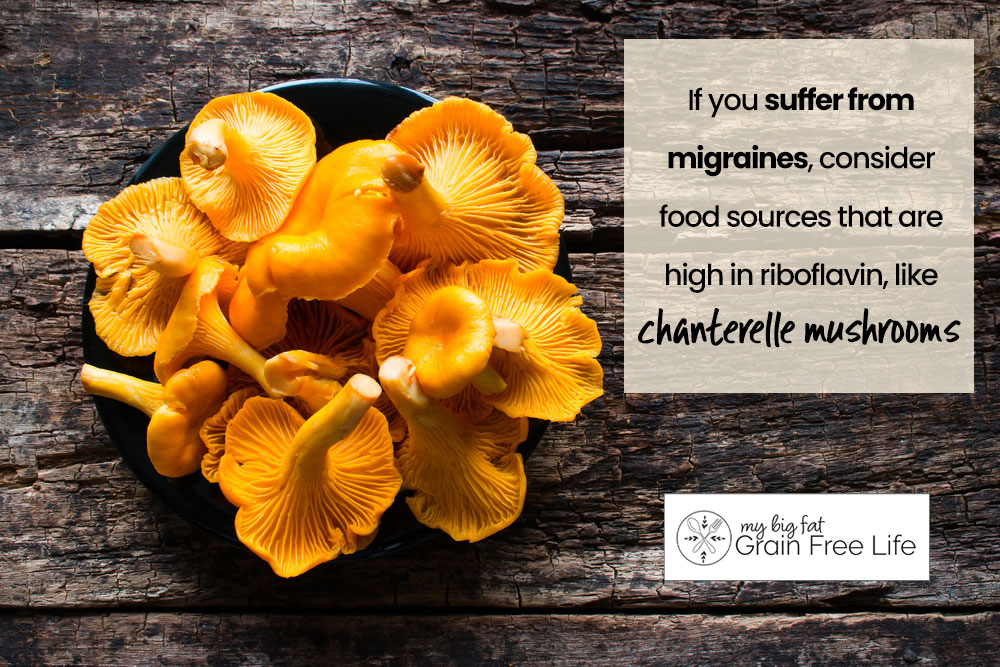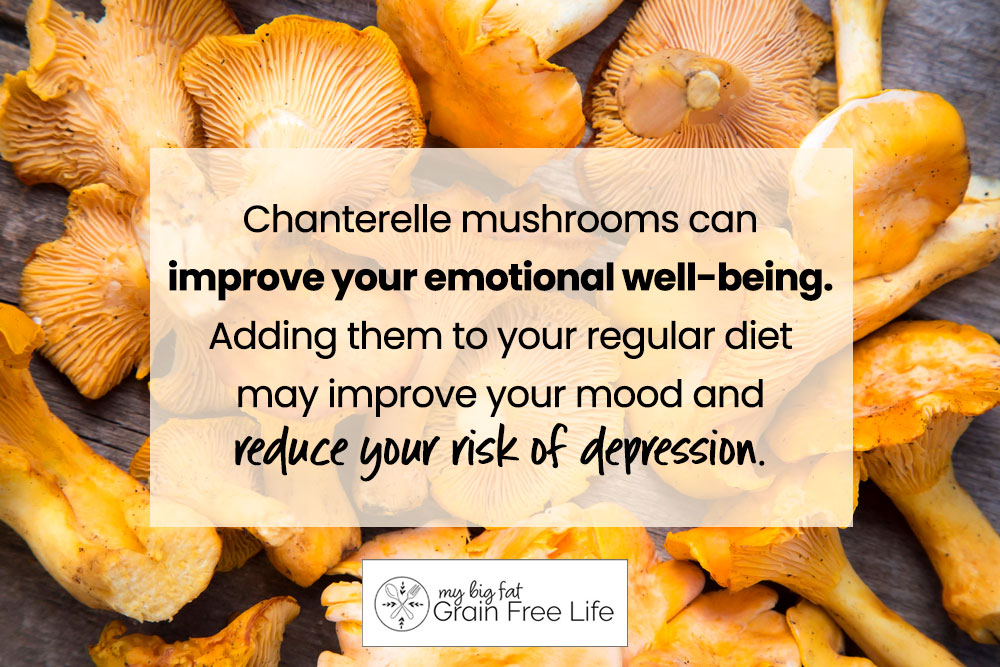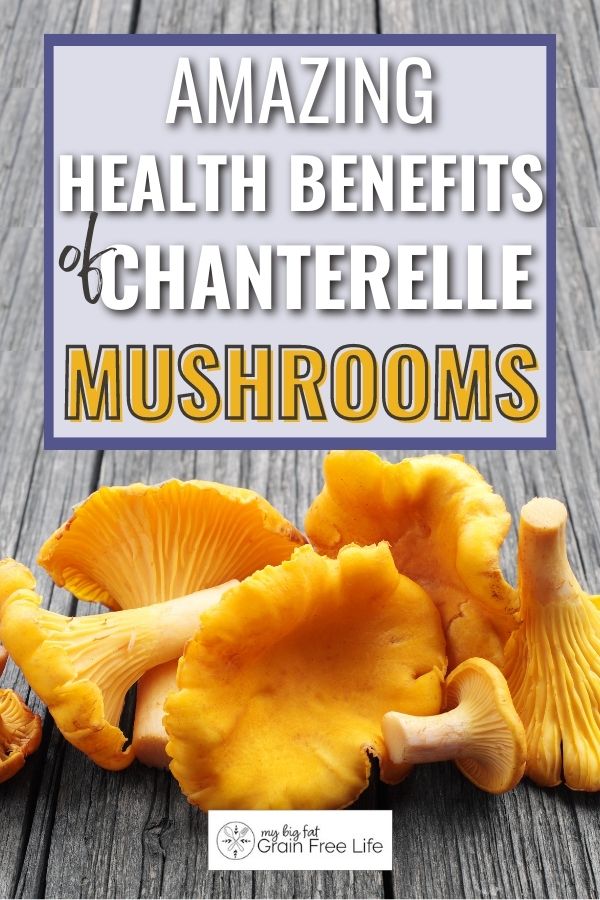Amazing Health Benefits of Chanterelle Mushrooms
This post may contain affiliate links. If you make purchase after clicking a link, I may receive a commission at no extra cost to you.
Last Updated on July 24, 2023
There are some great health benefits of chanterelle mushrooms. Not only are they really good for you but they can help you reduce stress, maintain healthy skin, boost your immune system, and may even help migraines! That’s just the beginning of the health benefits you can get from adding chantrelle mushrooms to your diet. Read on to learn more.
Health Benefits of Chanterelle Mushrooms
If you’re looking for healthy food to add to your diet, you can’t go wrong with chanterelle mushrooms! These beautiful wild mushrooms have a slightly fruity flavor, funnel-shaped cap, and are full of nutrients.
All mushrooms are an alkaline food and can be incorporated into meals when you are on the following special diets: Autoimmune Protocol, Paleo, SCD, GAPS, Whole 30, and Keto.
Although chantrelles are not an adaptogenic mushroom, they still have a wide range of benefits. Here’s a list of the health benefits of chanterelle mushrooms.
Nutrients in Chanterelle Mushrooms
Foraged chanterelle mushrooms are rich in vitamin D and contain nutrients like copper, niacin, polysaccharides, and fatty acids.
Source of Polysaccharides
If you’re looking to add more polysaccharides to your diet, you need to munch on a few yummy chanterelle mushrooms. They’re full of polysaccharides like chitin and chitosan.
Antimicrobial Properties of Chanterelle Mushrooms
Mushrooms may have strong antimicrobial activity. Antimicrobial activity means that the mushrooms may kill the microbes that cause disease.
Chanterelle Mushrooms are Rich in Antioxidants
Antioxidants are compounds that help protect you from chronic disease. They also may reduce inflammation and neutralize harmful free radicals in your body. The nutrients in chanterelle mushrooms include several antioxidants like beta-carotene, flavonoids, and ascorbic acid.

Health Benefits of Chanterelle Mushrooms
You might be surprised that eating chantrelle mushrooms can benefit your health in so many ways! They may improve cognitive function, reduce stress, and promote bone health, and they can even help people who suffer from migraines.
Keep reading to learn about even more health benefits of chantrelle mushrooms.
Improves Cognitive Function
Chanterelle mushrooms includes minerals and vitamins that may help brain function. One example is the copper in the fungi that is necessary for brain development.
Reduces Risk of Type 2 Diabetes
Including chanterelle mushrooms in your diet may reduce your risk of developing type 2 diabetes. This is because the vitamin D in the mushrooms helps with insulin sensitivity and controls the functions of beta cells.
Stress Reducer
The fungi may also improve emotional well-being and help reduce stress.
Better Bone Health
You need vitamin D in your diet to support bone health as it improves calcium absorption and strengthens your bones. A lack of vitamin D may be associated with the risk of bone fractures and osteoporosis.
Chanterelle mushrooms are an excellent source of vitamin D, so including them in your diet may give you strong bones.
Maintains Healthy Skin
Chanterelle mushrooms contain vitamin B3, which is necessary for healthy, glowing skin. The vitamin also may reduce acne and other skin-related issues.
Chanterelle Mushrooms May Help Migraines
A lack of riboflavin can cause headaches and migraines, so if you’re suffering from migraines, consider food sources that are high in riboflavin, like chanterelle mushrooms.

Chanterelle Mushrooms Health Benefits
Due to the anti-inflammatory properties of chantrelle mushrooms they are great for your body. They can support a healthy heart, give your immune system a boost, and even help treat wounds.
Supports the Cardiovascular System
Chanterelle mushrooms contain a compound called ergosterol. Ergosterol has antioxidant properties and helps to prevent cardiovascular disease. Plus, the fiber in the mushrooms is excellent for reducing the amount of bad cholesterol in your body.
Provides Immune Support
The fungi are an excellent source of nutrients that support the immune function of your body. For example, they’re high in the mineral copper, which helps to decrease your body’s susceptibility to bacterial infections.
They also contain flavonoids. Flavonoids have an antioxidant, anticarcinogenic, and anti-inflammatory effect. Eating chanterelle mushrooms may help to give you a strong immune system.
Promotes Healthy Liver
The nutrients present in chanterelle mushrooms may give them the ability to cleanse the liver of toxins. This will help you maintain a healthy liver.
Wound Treatment
The fungi may help your body heal from wounds, and the mushroom can be used medically in treating wounds.
Chanterelle Mushrooms are Anti-inflammatory
The mushrooms are rich in antioxidants that counter free radicals and reduce inflammation in your body.
Chanterelle Mushrooms May Enhance Mood
Chanterelle mushrooms can improve your emotional well-being. Adding them to your regular diet may improve your mood and reduce your risk of depression.

Chanterelle Mushrooms May Help Lower Blood Pressure
The mushrooms have very little sodium and decrease bad cholesterol, so adding them to your diet may help to lower your blood pressure.
Chanterelle Mushrooms May Help Reduce Risk of Cancer
The antioxidants present in chanterelle mushrooms may help to lower your risk of cancer.
Chanterelle Mushrooms May Improve Muscle Mass
Essential amino acids are the building blocks of protein. As chanterelle mushrooms have all of these amino acids, eating them may improve your muscle mass.
Chanterelle Mushrooms May Help PMS
The fungi help to balance your hormones and may help with PMS.
Chanterelle Mushrooms Help Alzheimer’s Disease
There are indications that eating chanterelle mushrooms may reduce the possibility of developing Parkinson’s, Alzheimer’s diseases, and other neurodegenerative diseases.
Chanterelle Mushrooms Reduce Cholesterol Levels
The fiber in golden chanterelle mushrooms and other varieties of chanterelle reduces cholesterol levels. This may also reduce your risk of heart disease.
Chanterelle Mushrooms May Lower Risk of Infectious Disease
The mushrooms help the human body maintain good health as they may increase the proliferation effect of the B and T cells that secrete antibodies. This improves your immune system’s ability to fight off external threats.
Use in Traditional Chinese Medicine
Different types of mushrooms have been used in traditional Chinese medicine for a long time. Chanterelle mushrooms are used to treat eye conditions such as eye inflammation. They also help with dry skin.
Herbal Medicinal Properties
Chanterelle mushrooms are full of essential vitamins and minerals as well as other important nutrients. This allows them to be used to have herbal medicinal properties that help you maintain good health.
- Anticarcinogenic
- Antigenotoxic
- Anti-inflammatory
- Antimicrobial
- Antioxidant
- Immunomodulant
- Vulnerary
Varieties of Chanterelle Mushrooms
Chanterelle mushroom varieties are grown in many different parts of the world. The Cantharellus cibarius, a type of golden chanterelle mushroom, is found in Europe.
In the Pacific Northwest in the United States of America grows the Cantharellus formosus which is also known as the Pacific golden chanterelle. A beautiful red-orange variety, the Cantharellus cinnabarinus is found in the Eastern united states. It’s also known as the cinnabar chanterelle.
Here’s a list of the different types of Chanterelle mushrooms you may find.
- Golden Chanterelle
- Cinnabar-red Chanterelle
- Smooth Chanterelle
- Small Chanterelle
- White Chanterelle
Nutrition Info for Chantrelle Mushrooms
With only 20 calories per serving, they make for a guilt-free indulgence. These mushrooms are naturally low in fat, cholesterol, and sodium, making them a healthy choice for those watching their intake.
In terms of carbohydrates, chantrelle mushrooms provide 4 grams per serving, with 2 grams of dietary fiber. The fiber content contributes to a healthy digestive system and helps maintain a feeling of fullness. Additionally, these mushrooms contain 2 grams of natural sugars, giving them a subtly sweet taste.
Chantrelle mushrooms are also a good source of protein, providing 2 grams per serving. Protein is essential for building and repairing tissues in the body, making these mushrooms a valuable addition to any meal.
When it comes to vitamins and minerals, chantrelle mushrooms offer a modest amount. They contain 6% of the recommended daily intake of iron, which is crucial for oxygen transport and energy production in the body. They also provide 4% of the recommended daily intake of potassium, an important mineral for maintaining healthy blood pressure and fluid balance.
View a chantrelle mushrooms nutrition label.
How to Forage for Chanterelle Mushrooms
As chanterelle mushrooms are wild edible mushrooms that can be found worldwide, foraging is common. The chanterelle season is summer through late December. The mushrooms are usually found in forested areas.
Make sure you go with a reliable guide. The toxic jack-o-lantern mushroom is very similar to the chanterelle mushroom. It grows on fallen logs and has true gills. Eating one will give you intense cramps and some serious digestive problems.
How to Store Chanterelle Mushrooms
Store your raw chanterelle mushrooms in a breathable paper bag. Place the bag in a dark, cool environment like the refrigerator. The mushrooms may last for a week if they’re properly stored. But it’s best to eat the fresh mushrooms within three to five days
How to Prepare Chanterelle Mushrooms
Start preparing your mushrooms by cleaning them with a mushroom brush or a damp paper towel. Make sure you don’t wash the mushrooms until you are ready to use them. The mushrooms become slimy and spoil easily.
Once you’ve cleaned the mushrooms, you can use a paring knife to trim the stems. It’s recommended that you eat the mushrooms cooked as raw chanterelle mushrooms may cause nausea and vomiting.
You can rehydrate the dried mushrooms by soaking them in hot water until they’re soft.
The yellow chanterelle mushrooms and other chanterelle mushrooms can be added to various side dishes. You can also add them to a white sauce pasta dish, toss them on top of a pizza, or use them in other recipes.
A serving of chanterelle mushrooms is one cup and is a good source of vitamins. With chantrelle’s meaty texture, earthy flavor, and peppery taste, they are a tasty addition to any dish.
Possible Adverse Effects
When you’re foraging for chanterelle mushrooms, be careful about your location. Mushrooms that are found near highways or industrial sites may contain contaminants like heavy metals and pesticides.
In addition, some people may be allergic to the mushrooms.
Frequently Asked Questions About Chanterelle Mushrooms
If you have more questions about adding chanterelle mushrooms to your diet, keep reading. You’ll find answers to many of the most frequently asked questions.
Can Chanterelles Make You Sick?
It’s recommended that you eat the mushrooms cooked as raw chanterelle mushrooms may cause nausea and vomiting.
Can You Eat Chanterelles Raw?
It’s important to note that while chanterelle mushrooms should always be cooked thoroughly before consumption to ensure their safety. Additionally, foraging for wild chanterelles requires expert knowledge to avoid poisonous look-alikes, so it’s best to purchase them from trusted sources or consult with an experienced forager.
Are There Poisonous Chanterelles?
Chanterelles are a type of edible mushroom that is difficult to find in grocery stores. However, the poisonous jack-o-lantern mushroom looks similar to the chanterelles. Eating one will cause intense cramps and serious digestive issues.
Can I Refrigerate Chanterelles?
You can refrigerate chanterelles. As a matter of fact, they’re best stored in a refrigerator inside a paper bag.
Final Summary on Chanterelle Mushrooms
Chanterelle mushrooms are an excellent source of essential nutrients like vitamin C, B vitamins, and copper. Making them part of your diet may improve your brain health and calcium absorption while also reducing your risk of heart disease.








